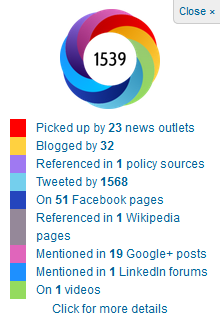When a researcher, colleague, tenure committee or conference organizer tries to find you on the internet, will they find what you want them to find? Will the scholarship they find be accessible to them?
You can take control by consciously curating your scholarly identity and by making more of your work openly accessible.
Some options available to you are online identifiers, profile systems, sharing platforms, academic social networks, and monitoring tools. The Libraries’ new Scholarly Identity guide provides information on all these tools and techniques, but here are some suggestions for boosting your visibility:
Get an ORCID ID and use it
ORCID at BC allows you to register for an ORCID ID and link it to your BC ID. ORCID has become the primary standard identifier for academic authors. It solves any name ambiguity issues with a permanent identifying number that can be displayed on your publications. As BC rolls out its new faculty profiles, your ORCID ID will be added as an identifier right below your email address. These IDs are clickable links to your profile. It is easy to import publications from Scopus, CrossRef and Google Scholar into your ORCID profile with no manual entry. As you continue to publish and submit your ORCID with your manuscript, publishers will push the metadata for your article directly to your profile – keeping it up to date with no input from you. An added bonus is that, when you fill out your Faculty Annual Report, you can import citations from ORCID into your Works report, again with no manual entry. Find out more on our ORCID at BC guide.
Create a Google Scholar Profile
In Google Scholar, go to My Citations and create a profile by filling out a brief form. When you click the + sign to add citations, Google scholar will suggest articles it thinks might be yours. You select the ones you want in your profile. An added bonus of Google Scholar is that it will show you how many citations each article has in other Google Scholar-indexed items, and provides links to those articles. It also calculates and displays your h-index, a measure of author influence. You can import the metadata about your articles into your ORCID profile by copying the BibTex version of the citations from Google Scholar and importing that file into ORCID.
Share your work
There are many types of sharing platforms, archives maintained by Boston College, disciplinary repositories and academic social networks.
At Boston College, we offer two online archives for your work. eScholarship@BC can display most file formats and will accept working papers, conference presentations, creative works, scholarly articles, theses, dissertations, and multimedia. Works in eScholarship@BC are openly available to anyone in the world. This global open access repository aligns with the educational and social justice mission of Boston College. There is ample evidence that works that are openly available receive higher citation counts. You will receive a permanent link to each of your works to embed in your CV or website, and views and downloads are displayed for each work. All of the work in eScholarship@BC is digitally preserved for the long term.
Boston College also makes available the Boston College Dataverse, a repository for all kinds of data. It is hosted on the Harvard Dataverse platform. The data can be openly accessible or private, and it is possible to set terms of use for the data or to require permission. Each dataset receives a digital object identifier that can be used to site the data.
Disciplinary repositories are also an option. Many physicists deposit in arXiv, social scientists in ICPSR, and new disciplinary repositories are appearing at a fast pace. Your Subject Librarian can help you identify the one that meets your requirements.
Are Academic Social Networks (ASNs) a good choice?
The two most popular ASNs, ResearchGate and Academia.edu, are both praised and reviled, sometimes by the same scholars. Both allow you to share whatever you want regardless of copyright status. Both get visibility for your works from your colleagues. But, both are commercial companies. They are both actually dot-coms, despite the deceptive name. They have no preservation goals, so if they disappear, your work may too. They also may seek to monetize the data they contain. Many scholars also find their constant stream of emails annoying, yet hard to resist. A Forbes article published earlier this year drew attention to the pitfalls of these networks. By contrast, institutional repositories such as eScholarship@BC are able to publish authorized versions of your scholarship, ensuring that links you share with colleagues will always work.
Monitor your impact
Monitoring the growing impact of your scholarship can help you gauge the effectiveness of your efforts to create a robust, visible scholarly identity. You can check your citation counts in Google Scholar and also calculate your h-index in Scopus and in the free Harzing’s Publish or Perish application. You can set up a Google Alert, to be notified when your name is mentioned on the Web.
There are also new tools, such as the Altmetrics browser bookmarklet that will analyze the social media impact of your work including mention in blogs, news, tweets, policy papers – sources that traditional metrics don’t measure.

There is more information about each of these tools and techniques on the Scholarly Identity guide. There is a lot to choose from, and you can use multiple tools to get the word out on your work. The guide suggests factors to consider in making your choices, and your Subject Librarian is happy to help.
If you have specific questions or would like to know more, we will be hosting a Coffee and Code presentation on Scholarly Identity on October 26th at 3:00 PM in O’Neill 217.
Most important – take control of what others find when they search for you!
![The inscription reads: Do Recholhim[en]to De Coimbra.](https://sites.bc.edu/library-newsletter/wp-content/uploads/sites/35/2017/09/image005.jpg)